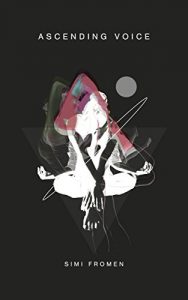Ascending Voice by Simi Fromen is a moving collection of poetry about putting yourself together after a broken relationship. Told in three sections -“Mud,” “Murky Waters,” and “Lotus” – the collection follows Fromen’s path from pain to renewal. It’s a deeply honest collection about healing that should help readers heal as well, especially those recovering from a divorce or other bad relationship.
Fromen writes from a decidedly New Age, yogic perspective. However, where New Age “think positive” writing can devolve into tropes and cliches, what makes Ascending Voice stand out is Fromen’s honesty. She is very clearly, by her own admission, writing the book to work her way out of a divorce, and there is very deep pain in her words. In “Mud,” the first section of the book, which focuses on these painful moments, she writes vividly and even darkly about her experiences, while not always pointing the finger outward.
For instance, in the very first poem, “Breathless,” she writes, bluntly,
We called it love.
Now I know it was nothing
other than pride under our sheets.
Anyone who’s been in a bad relationship, and certainly a bad marriage, will be able to see themselves in Fromen’s work. In this way, the poems are more universal than might be considered by her introduction, which is heavy on spiritual themes. There’s nothing overtly spiritual about the sentiments in the first section, but that’s precisely the point – she lost some of her true self and then tried to regain it. This book is one path to putting herself together again.
The second section of the collection, “Murky Waters,” gets more introspective, and more spiritually directed, though she is still holding onto a lot of past pain, hence the murkiness. But here is where Fromen begins to heal, and her message becomes more positive. She is coming to terms with her past, as in the striking “Roses and Thorns”:
No apologies for my wounds.
Deep and nestled
in crevices of my flesh.
Finally, in the third section, “Lotus,” Fromen has been released. There is still weakness here, as memory never goes away, but there is also transcendence. She speaks positive messages about not only the heart, but body as well. Where the earlier poems looked inward, here she is writing more directly at the reader, as well as herself. She also writes more in the third person – as if the “she” of the poems could be about anyone.
Taken as a kind of collection of instructions, readers should be able to find strength in witnessing Fromen’s rise to self-awareness and self-regard. The book doesn’t just give readers the tools to feel good, but to feel bad. Fromen isn’t wallowing in the pain of her marriage, but studying it, figuring out how and why it went wrong, and how to move forward.
Overall, the collection is strong, but it does rely too much on motifs like “destiny” and “heart.” Obviously, the heart is at stake in any relationship, but some of Fromen’s metaphors and symbolism veer towards the sentimental. It’s when she’s the most brash that the collection is the most powerful. When she writes something like “tomorrow, the sun will rise again,” it is less moving than her poems that are more personal and original.
Taken as a whole, the collection is an inspiring work. Fromen’s voice is both raw and hopeful, and in her words readers should find solace, as well as motivation for finding their own inner peace and strength, as Fromen has done here.
Links
Author Site
Facebook
Twitter
Amazon
Goodreads
STAR RATING
Design
Editing
Content
Get an Editorial Review | Get Amazon Sales & Reviews | Get Edited | Get Beta Readers | Enter the SPR Book Awards | Other Marketing Services
























Leave A Comment